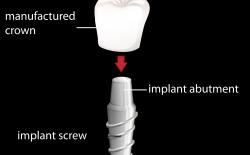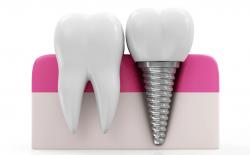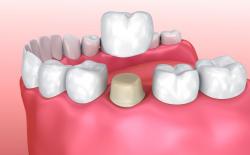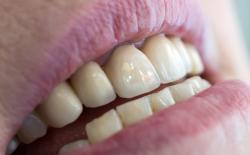Advantages of zirconia crowns
Zirconia is becoming one of the most often used materials in restorative dentistry.
Not only crowns, but bridges, veneers, even implants are manufactured using zirconia.
Its many advantages include:
- Superior looks: As zirconia is white naturally, it allows the transformations to any shade which matches the rest of your teeth. Zirconia is translucent, it mimics the translucency of your natural teeth.
- More confident smile: Zirconia has no metal lining at the gums. Porcelain fused to metal crowns were popular earlier, however, they have a metal layer underneath the porcelain layer which is on top of the crown. This fusion/metal lining is usually visible at the gum line and is noticeable when you smile. Zirconia crowns help you get over this and boost your confidence. You can also give zirconia any shape/size to match the rest of your teeth.
- 100% biocompatible: No zirconia crown allergy has been reported so far.
- Extraordinarily tough: Zirconia is the strongest crown, it can withstand wear and tear. It does not chip off, unlike porcelain. If you maintain it well, it can stay in your mouth forever. It is at least five times stronger than porcelain or porcelain fused to metal. It also tolerates chewing or biting forces well. It has a very high flexural strength: zirconia has a flexural strength of 1200 MPa. (Flexural strength is the force that your crown tolerates.)
- Bond well with your tooth: Zirconia crowns adhere well to your tooth. One of the reasons why PFM crowns were the preferred choice earlier is that the metal surface bonds well with the tooth and holds the crown in place. Zirconia also has this property. These crowns require less tooth removal than many other types of dental crowns.
- Metal-free: Many people used to prefer gold crowns because of their excellent physical properties. However, as esthetics became more important, most patients were looking for a better solution than gold. Some people also don’t like having metals in their bodies, zirconia is well suited for them too.
The esthetics factor of a zirconia crown should be the biggest advantage. You must have dental crowns that will look natural, especially if they will be fitted on your front teeth and will be visible when you smile.
The ability of zirconia to be shaped according to the set of teeth it will be placed alongside is very important.
Zirconia crown will not only replace a tooth but it can be shaped so that it will look better than the one it will be replacing. This is why you can spot that perfect natural-looking smile anytime.
Zirconia manufacturers are now producing and designing dental crowns custom milled from a solid block of the material and baked at ultra-high temperatures to ensure that the finished crowns are almost indestructible.
The fact that this material is biocompatible means that it is safe to stay within your mouth for a long time. There is no need to worry about any adverse/allergic reactions because zirconia is not rejected by the human body.
A video about the advantages of BruxZir® Solid Zirconia crowns. Duration: 1:56.
Disadvantages of zirconia crowns
- May wear out the opposing teeth: As zirconia crowns are very tough, crowns may cause wear issues against your natural teeth.
- Secondary caries/tooth decay: Another disadvantage is that, although the crown itself will be almost indestructible, a decay underneath the crown - called secondary caries - caused by the abrasion of the hard material against the opposing teeth is not noticeable. You will only realize that there is decay once the crown falls off or becomes loose.
- Expensive: Zirconia crowns may cost you more than other crowns. However, it’s almost like a one-time investment if you maintain them well. If you go for a low-cost crown, it may chip off easily and turn out embarrassing as well as expensive in the long run.
How much does a zirconia crown cost?
The average cost of a zirconia crown in the United States is $1,000 - $1,500.
This price doesn't include any additional treatment you might need (e.g. implant, root canal, etc.).
Some dentists might charge more than this, in the $1,500 - $2,000 range or even more, but it's rare to find prices lower than $1,000.
If you are in the United Kingdom, you'll probably pay around £500 - £900 for a single zirconia crown.
In Canada, prices are similar to prices in the States while in Australia be prepared to pay 10% - 20% above US prices.
Costs vary widely depending on:
- the country you live in
- the experience of the dentist and the dental technician providing the treatment
- the size of the crown/tooth
- the position of the tooth that needs to be crowned
However, in general, zirconia is indeed among the more expensive types of dental crowns.
Unfortunately, the increased durability, the natural look, and biocompatibility come with a price tag...
If you need multiple crowns, it might be economical to travel abroad to get the treatment. Zirconium crowns cost around $200/£130 in India, $450/£300 in Hungary, and $550/£360 in Mexico.
A few factors to consider:
- If the clinic is in a prime location the charges are higher. If you can travel for 30 minutes, to reach a practice which is a little interior, you can save at least 10%.
- In the U.S. periodontists are the specialists for crowns. Their charges are higher than general dentists.
- Single sitting crowns may be more expensive than multiple sitting crowns. However, they address your need immediately and save your time and the need for multiple appointments.
Here is a rough estimate of zirconia crown prices in various countries:
- United States: $1,000 - $1,500
- United Kingdom: £500 - £900
- Canada: $1,000 - $1,500
- Australia: $1,100 - $1,600
Need a local dentist?
Zirconia crowns an esthetic and durable solution for restoring your teeth.
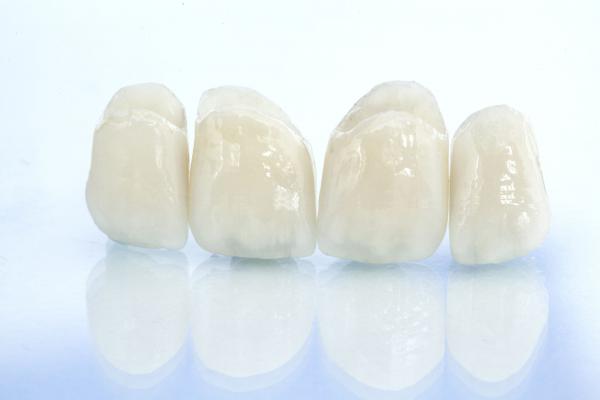
Zirconia crowns vs porcelain crowns
The biggest advantage of full porcelain crowns over zirconia crowns used to be esthetics.
However, with the newest manufacturing techniques, zirconia crowns can also be made highly esthetic.
You should always consult with your dentist about your options, but there are several reasons why zirconia is usually the preferred:
- zirconia crowns are definitely more robust
- zirconia usually lasts longer
- porcelain crowns tend to chip and break
- zirconia is a much more stronger and durable material
- zirconia crowns provide strength without that bulky appearance that porcelain is so known for
In case porcelain needs to be fused to a metal base - this is called porcelain fused to metal crown or PFM crown -, a black line above the gums might be visible.
How is a zirconia crown prepared?
Zirconia crowns are prepared from a single block of zirconia and are known as monolithic zirconia.
Therefore, these crowns are resistant to fracture as well as wear and tear. You can have a zirconia crown via a single sitting as well as multiple sitting appointments.
Earlier zirconia crowns used to have a porcelain layer which used to chip off. Now with the use of monolithic zirconia, your crown does not chip off.
A short video about zirconia crown preparation. Duration: 1:52
Frequently asked questions
Which is better zirconia or porcelain crown?
Zirconia is usually the preferred choice, as it is more durable and stronger.
Esthetics used to be the main advantage of porcelain crowns, but nowadays zirconia crowns are also highly esthetic.
However be sure to discuss your options with your dentist, as in your particular case porcelain might be a better option.
Are zirconia crowns better than E-max?
Zirconia crowns are stronger than E-max crowns, but don't look as natural. Therefore E-max is usually used for front restorations and zirconia is used for back teeth.
For a more detailed comparison, check out our article about zirconia vs E-max crowns.
How long do zirconia crowns last?
The average lifetime of a dental crown is around 5-15 years.
If you exercise proper oral hygiene, your zirconia crown can last 10 years or more.
Are zirconia crowns safe?
Yes, zirconia crowns are safe.
Zirconia is metal-free, allergic reactions to this material are very-very rare.
They are also very strong, don't crack or chip, so they should last several years, even a lifetime if you don't neglect your oral hygiene.
Can zirconia crowns break?
Since zirconia is very durable, these crowns rarely break.
However, problems during the manufacturing and preparation phases might cause crown fractures.
Things like sharp edges or not removing enough tooth material (that means the crown will be too thin) might cause fractures.
Do zirconia crowns stain?
Zirconia has good resistance to staining. This is because it's non-porous material - unlike porcelain.
Minor surface stains caused by coffee, cigarettes, and some other foods can usually be removed by your dentist during your regular check-up.
Are zirconia crowns expensive?
While there are great differences in prices, zirconia crowns are among the more expensive crowns.
However they usually last very long, so going for a zirconia crown might turn out to be cheaper in the long term.
This is definitely something you need to discuss with your dentist.
Need a local dentist?
You might also be interested in:
How Long Do Dental Crowns Last?
Dental crowns usually last for about 5-15 years, however, in certain cases they can last a lot more.
Dental Crown Pain
Secondary caries, infection, and loose crowns are some of the most common reasons for dental crown pain.
E-max Crowns
E-max crowns are also very popular. Just like zirconia crowns, they look great, are durable, and not cheap...
